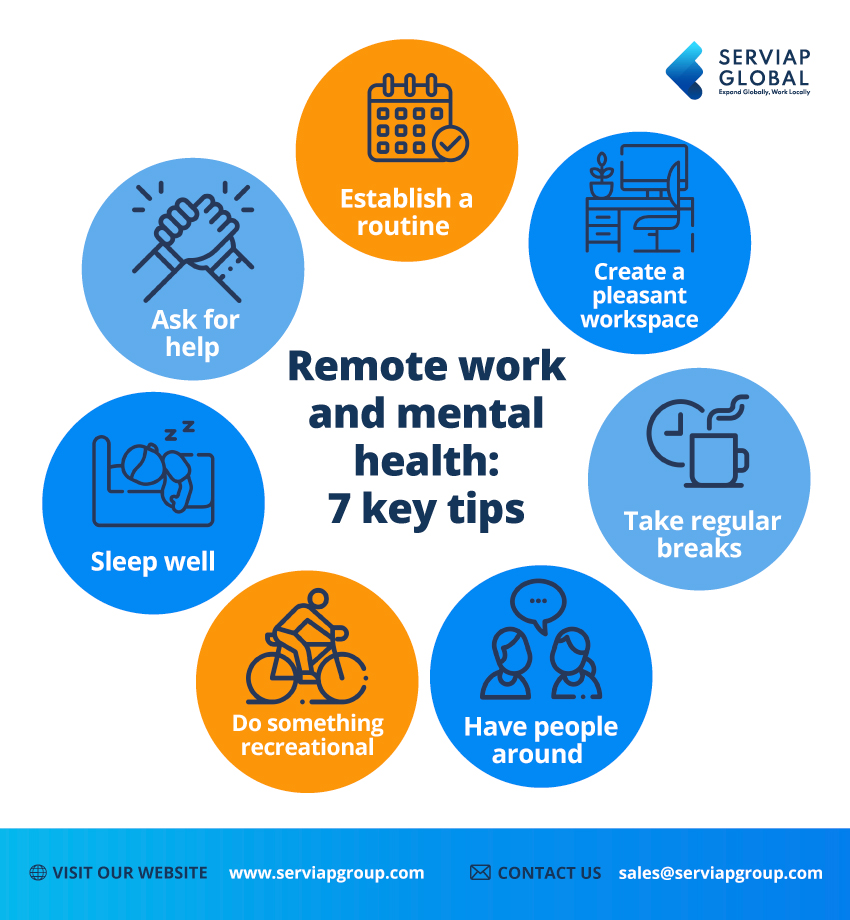
Remote Work, Real Wellness: Strategies for Mental Health Support
Written: Vagabondist Staff| September 1, 2023

The Challenges of Remote Work on Mental Health
Remote work offers flexibility and convenience, but it also comes with its fair share of challenges, particularly when it comes to mental health. As a remote worker, it's important to be aware of these challenges and implement strategies to support your well-being.
Increased feelings of isolation and loneliness
Working remotely can lead to feelings of isolation and loneliness, especially if you're used to working in a social environment. To combat this, make sure to stay connected with colleagues and friends through regular video meetings, virtual coffee breaks, or even joining online communities related to your industry. It's also important to take breaks throughout the day to engage in activities that promote social connection, such as calling a loved one or participating in online group activities.
Difficulty in maintaining work-life balance
One of the biggest challenges of remote work is maintaining a healthy work-life balance. Without clear boundaries between work and personal life, it's easy to find yourself constantly working or feeling guilty for taking time off. Establishing a dedicated workspace, setting boundaries around working hours, and prioritizing time for self-care and relaxation can help maintain a healthier balance.
Lack of social interaction and support
In a traditional office setting, you have the benefit of social interaction and support from colleagues. As a remote worker, it's important to actively seek out social interaction and support. This can be done through virtual team activities, participating in online communities, or even attending virtual conferences and networking events. It's also beneficial to reach out to colleagues for support or seek professional help when needed.
By being proactive in addressing these challenges and prioritizing your mental health, remote work can be a fulfilling and enjoyable experience. Remember to regularly check in with yourself, take breaks, and seek support when needed to maintain a healthy work-life balance and well-being

Strategies for Remote Work Mental Health Support
Establishing a routine and clear boundaries
When working remotely, it can be easy to blur the lines between work and personal life, leading to increased stress and burnout. To support your mental health, establish a consistent routine and set clear boundaries between work and personal time. Create a schedule that includes designated work hours and breaks, and stick to it. Communicate your boundaries with your colleagues and let them know when you are available.
Creating a designated workspace
Having a dedicated workspace can help create a separation between work and home life and improve focus and productivity. Set up a designated area in your home where you can work without distractions. Make sure it is comfortable, well-lit, and equipped with everything you need to perform your tasks effectively.
Prioritizing self-care and stress management
Self-care is crucial for maintaining good mental health, especially when working remotely. Take breaks throughout the day to recharge and engage in activities that bring you joy and relaxation. Incorporate stress management techniques such as meditation, deep breathing, or exercise into your daily routine to reduce stress levels and increase resilience.
Seeking virtual social connections
Working remotely can sometimes feel isolating, making it important to seek virtual social connections. Schedule regular video or phone calls with colleagues, friends, or family members to maintain social connections and combat feelings of loneliness. Participate in online communities or professional networks related to your field of work to engage with like-minded individuals and foster a sense of belonging.
Remember, your mental health should always be a priority. By implementing these strategies, you can better support your well-being while working remotely

Remote Work Mental Health Tools and Resources
Working remotely can come with unique challenges that can impact your mental health. However, there are various tools and resources available that can provide support and promote well-being. Here are some options to consider:
Teletherapy and online counseling services
Teletherapy and online counseling services offer the convenience of therapeutic support from the comfort of your home. These services connect you with licensed mental health professionals who can provide guidance, counseling, and support for a range of mental health concerns. Platforms like Talkspace and BetterHelp offer accessible and confidential counseling through video, phone, or messaging sessions.
Mental health apps and platforms
There are numerous mental health apps and platforms that offer resources and tools for managing stress, anxiety, and other mental health concerns. Apps like Headspace, Calm, and Moodfit provide features such as guided meditation, breathing exercises, mood tracking, and educational resources to promote mental well-being. These apps can help you develop healthy coping strategies and maintain a positive mindset.
Virtual support groups and communities
Virtual support groups and communities provide a space for individuals to connect with others who may be facing similar challenges. These groups offer support, encouragement, and a sense of community. Platforms like 7 Cups and Supportiv provide peer support through chat-based forums, allowing you to share experiences and receive advice and understanding from others.
Remember, prioritizing your mental health while working remotely is crucial for maintaining overall well-being. Exploring these tools and resources can provide the support you need to navigate the unique challenges of remote work and promote a healthy work-life balance.
Employer's Role in Remote Work Mental Health Support
Working remotely has become increasingly popular in recent years, and even more so in light of the COVID-19 pandemic. While remote work offers numerous benefits, it also presents unique challenges when it comes to mental health. Employers have an important role to play in supporting the mental well-being of their remote employees.
Providing access to mental health benefits and resources
Employers can demonstrate their commitment to their employees' mental health by providing access to mental health benefits and resources. This can include offering comprehensive health insurance plans that cover mental health care, providing access to employee assistance programs (EAPs), and partnering with mental health organizations to offer counseling services or workshops. By making mental health resources readily available, employers can ensure that their remote employees have the support they need.
Regular check-ins and supportive communication
Regular check-ins and supportive communication are essential for maintaining the mental well-being of remote employees. Employers should make an effort to check in with their remote team members on a regular basis, not only to discuss work-related matters but also to inquire about their overall well-being. These check-ins can be done through video calls, phone calls, or even through messaging platforms. In addition to regular check-ins, employers should create a supportive and inclusive remote work culture where employees feel comfortable discussing any challenges they may be facing.
By taking an active role in supporting the mental health of their remote employees, employers can create a positive work environment and foster a sense of well-being among their team members.

Tips for Self-Care and Mental Well-being
Engaging in regular exercise and physical activity
To support your mental health while working remotely, it's crucial to prioritize regular exercise and physical activity. Incorporating physical movement into your daily routine helps reduce stress and boosts your mood. This could include going for a walk or run, practicing yoga or other home workouts, or even dancing to your favorite tunes. Find activities that you enjoy and make them a part of your daily schedule. Remember to take breaks from sitting for long periods and stretch regularly to keep your body and mind energized.
Taking breaks and practicing mindfulness
Taking short breaks throughout the day allows you to relax and recharge. Step away from your workspace, engage in activities that help clear your mind, such as meditation or deep breathing exercises. Practicing mindfulness can help reduce anxiety and increase focus and productivity. Find a quiet space where you can unwind and practice mindfulness techniques that work best for you.
Setting realistic goals and managing expectations
Working remotely can blur the boundaries between work and personal life, leading to increased stress. To maintain a healthy work-life balance, it's important to set realistic goals and manage your expectations. Prioritize your tasks and allocate specific work hours. Stay organized and create a routine that allows time for both work and personal activities. Remember to communicate your availability and boundaries with your colleagues and clients, ensuring a clear understanding of your work expectations.
By incorporating these tips into your remote work routine, you can support your mental well-being and maintain a healthy work-life balance. Remember that taking care of your mental health is just as important as performing your job duties.

The Future of Remote Work Mental Health Support
Potential advancements in technology for remote mental health care
As a remote worker, it is important to take care of your mental well-being. Thankfully, advancements in technology are making it easier to access mental health support from the comfort of your own home. Here are some potential advancements to look out for in the future:
-
Teletherapy: Teletherapy involves connecting with a mental health professional through video calls or online messaging platforms. This allows individuals to receive therapy sessions without the need for in-person appointments. It provides convenience and accessibility for those who may not have access to traditional therapy options.
-
Wellness apps: There are numerous wellness apps available that offer mindfulness exercises, meditation sessions, and stress management techniques. These apps can be easily accessed on your smartphone or computer, providing support whenever and wherever you need it.
The integration of mental health support in remote work policies
Companies are recognizing the importance of mental health support for remote workers and are beginning to integrate it into their policies. Here are a few ways companies are providing mental health support:
-
Employee Assistance Programs (EAPs): EAPs are programs offered by companies that provide confidential counseling and support services to employees. These programs often include mental health support, such as counseling sessions or access to resources for stress management.
-
Mental health days: Some companies are offering additional paid time off specifically designated for mental health purposes. These days allow employees to take a break from work and focus on their well-being without feeling guilty or sacrificing their vacation days.
-
Flexible working hours: Companies are recognizing that flexibility is key to maintaining good mental health. Offering flexible working hours allows employees to prioritize self-care and manage responsibilities outside of work.
In conclusion, the future of remote work mental health support looks promising with advancements in technology and the integration of mental health support in company policies. As a remote worker, it is important to take advantage of these resources and prioritize your mental well-being

Conclusion
The importance of prioritizing mental health in remote work
Working remotely can bring many benefits, such as flexibility and increased productivity. However, it also comes with its own challenges that can impact mental health. It is crucial to prioritize mental well-being to ensure a successful and fulfilling remote work experience.
Remote work often involves increased isolation, blurred boundaries between work and personal life, and a lack of social interaction. These factors can contribute to feelings of loneliness, stress, and burnout. Recognizing the importance of mental health in remote work is the first step towards maintaining overall well-being.
Final thoughts and encouragement for seeking support and maintaining well-being.
While working remotely, it is essential to proactively take steps to support your mental health. Here are a few strategies:
-
Maintain a routine: Establish a daily schedule that includes regular breaks, exercise, and leisure activities to create structure and promote work-life balance.
-
Stay connected: Make an effort to stay connected with colleagues, friends, and family members through virtual meetings, phone calls, or chat platforms. Engaging in social interactions can help combat feelings of isolation.
-
Seek support: Don't hesitate to reach out to your employer, colleagues, or mental health professionals if you are experiencing difficulties. Many organizations offer resources and support for remote employees' mental well-being.
Remember, taking care of your mental health is just as important as achieving professional success. Prioritizing self-care and seeking support when needed will ensure a positive and sustainable remote work experience.



